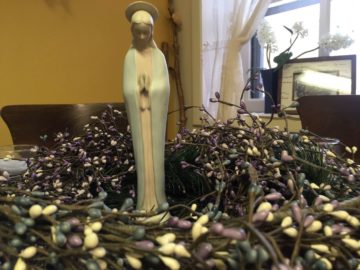Nearing the Fourth Sunday of Advent, we offer a Franciscan Gospel reflection and questions written by Fr. Paul Gallagher, OFM for your prayer. They are edited by Franciscan Sister of Christian Charity Sister Anne Marie Lom and Joe Thiel. The excerpts from the Sunday readings are prepared by Joe Thiel. To read or download the complete pdf with excerpts for your prayer, please click here: Franciscan Gospel Reflection December 22 2019. Excerpts are from the Lectionary for Mass for Use in the Dioceses of the United States of America, second typical edition © 2001, 1998, 1997, 1986, 1970 Confraternity of Christian Doctrine, Inc., Washington, DC. Used with permission. All rights reserved. No portion of this text may be reproduced by any means without permission in writing from the copyright owner. Photos: Holy Family Convent, Manitowoc, Wisconsin
Matthew 1:18-24
Now this is how the birth of Jesus Christ came about. When his mother Mary was betrothed to Joseph, but before they lived together, she was found with child through the Holy Spirit.
Joseph her husband, since he was a righteous man, yet unwilling to expose her to shame, decided to divorce her quietly. Such was his intention when, behold, the angel of the Lord appeared to him in a dream and said, “Joseph, son of David, do not be afraid to take Mary your wife into your home. For it is through the Holy Spirit that this child has been conceived in her. She will bear a son and you are to name him Jesus, because he will save his people from their sins.”
All this took place to fulfill what the Lord had said through the prophet: “Behold, the virgin shall be with child and bear a son, and they shall name him Emmanuel,” which means “God is with us.” When Joseph awoke, he did as the angel of the Lord had commanded him and took his wife into his home.
Background:
Everyday life in Matthew’s community was gender separated, even for those who were married. Marriages were arranged in negotiations by the women, and then confirmed by the patriarch of the house to make sure that the agreement was fair for both families. The primary concern was the economic and political influence that the two families would gain by the marriage. When all was in place, the marriage was announced and the period of betrothal began. The bride prepared to leave the house of her father, and the groom prepared a place for his bride in the house of his father. Unlike contemporary engagements, although the couple did not live together, they were considered married during the betrothal. If one should die, the other was considered a widow or widower. Engaging in sexual relationships outside of the betrothed relationship was considered adultery. Betrothal was the beginning of the marriage process that ended with the groom taking the bride into his house and consummating their marriage.
In the text, Joseph is described as a righteous man. Matthew’s community knew this meant that he faithfully observed the law of Abraham. According to Deuteronomy, Joseph should have had Mary stoned, because if the child did not belong to Joseph, the pregnancy was presumed to have been the result of her having committed adultery with another.
“If within the city a man comes upon a maiden who is betrothed, and has relations with her, you shall bring them both out to the gate of the city and there stone them to death: the girl because she did not cry out for help though she was in the city, and the man because he violated his neighbor’s wife. Thus shall you purge the evil from your midst.” (Deut 22:23-24)
Even though Joseph has taken great pains to be faithful to the law, he is also man of compassion. He is willing to set aside the clear requirements of the law and divorce Mary quietly. Perhaps he did this thinking that the true father of the child could come forward and claim the child as his heir and take both Mary and the child into his home. Then, in a dream, Joseph learned that Mary’s pregnancy was due to the intervention of the Holy Spirit, that the child was a highly favored male, and that his name was to be Jesus.
Totally changing one’s course of action because of a dream may be odd in the contemporary world. However, ordinary people of the day believed that God spoke to them in ordinary ways. Dreams were considered an ordinary part of each person’s life and awareness. As a result of his dream, Joseph took Mary into his house as his wife, gave the child the name Jesus as he had been directed, and claimed the child as his own son. Those are the obvious events in how Mary came to be Joseph’s wife and Jesus his apparent son.
Because of the many Church feasts associated with Mary, the Church has given us many opportunities to reflect on Mary’s surrender and her role in God’s plan. Matthew in this gospel places Joseph as the central figure in God’s plan to come among us as the incarnate presence of God. Joseph also gave up his own dreams, his plans, and his hopes to create his own family, name his own son, and have his own offspring to carry on his family line. Instead, he accepted God’s plan. He accepted God’s family and made it his own. It is one thing to have faith that God is working in this very unique situation, but it is another to surrender one’s own desire and plans for one’s own life in order to cooperate with what God is doing. This can be even more difficult when one has lived his life trying to be faithful to the law and the path to living a life in relationship with God’s desire. Sometimes Joseph is dismissed as the foster father of Jesus who passes quickly from notice in the Gospels and our own reflection. The Church, by placing this gospel text on the last Sunday in the advent season, is inviting us to reflect on Joseph as a model for our own preparation for Christmas, and also a model for how we prepare for the second coming and the fullest presence of God.
Reflection Questions:
1. What are some of the accomplishments that have helped shape your understanding of yourself?
2. How do you perceive God to be speaking to you in what you have done and in what you have failed to do?
3. Have you ever changed the direction of your life because of what you believed God was asking of you?
4. The gospel describes Joseph as a person who lived his life trying to be faithful to the law of Abraham. Can you name some people that you know who you might describe in similar terms?
5. Can you imagine any of them putting aside what they believed the law required, in order to act in the way that Joseph does toward Mary in this gospel?
6. What kind of soul searching do you think Joseph did before he made his decision to accept Mary as his wife and Jesus as his son?
7. Why do you think God chose to come into the world in a manner that required so much surrender of self on the part of Mary and Joseph?
8. Could this text, revealing how God chose to come into our world at the birth of Jesus, also be an indication of how God desires to break into our world today?
9. Can you take some time now to talk with God about your impression of Joseph, your own desire to be part of God’s coming into the world, or whatever arose within you from reading this gospel?




